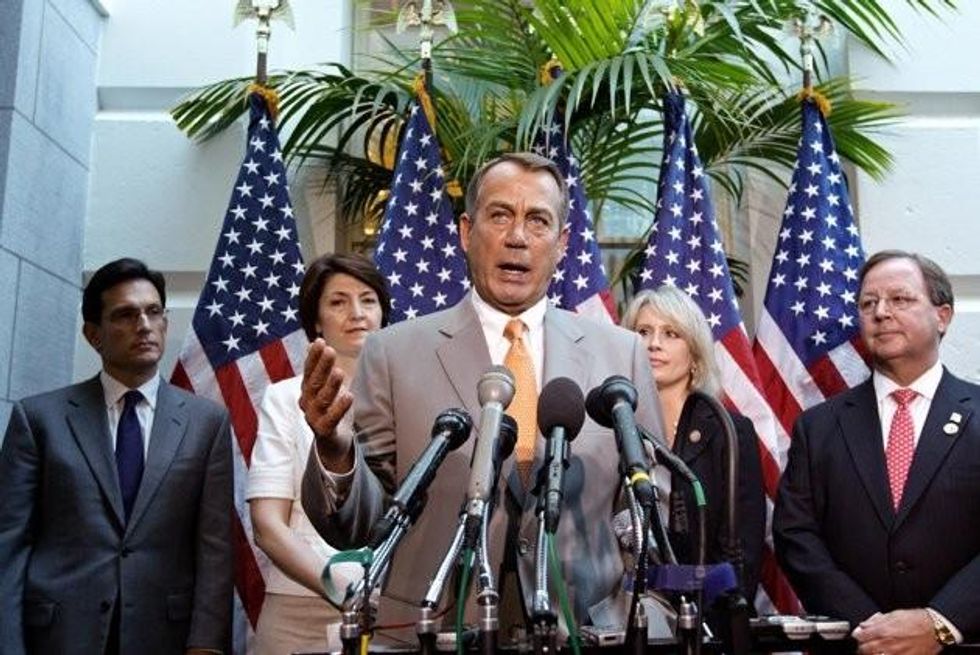

SUBSCRIBE TO OUR FREE NEWSLETTER
Daily news & progressive opinion—funded by the people, not the corporations—delivered straight to your inbox.
5
#000000
#FFFFFF
To donate by check, phone, or other method, see our More Ways to Give page.


Daily news & progressive opinion—funded by the people, not the corporations—delivered straight to your inbox.
While the US Congress is expected to approve a deal by Friday over how to prevent a spike in interest rates on federal student loans, College students should still expect to face a roughly $20 billion increase in the cost of those loans, reports the Washington Post.
Starting Sunday, students earning graduate degrees will be responsible for paying the interest on their federal loans while they are still attending school and immediately after they graduate. Additionally, the government will no longer cover the interest on undergraduate loans during the six months 'grace period' after students finish school.
These changes were swept under the rug as congress fought over the singular issue of maintaining a lower interest rate.
After this year's deal, students who take out loans over the next year will receive a lower interest rate but that interest will be charged as soon as they graduate. But students applying the following year will be hit with a "double whammy" including an even higher interest rate.
"It really makes the loans kind of unpredictable and hard to understand for students and families when these changes are happening through the budget process," said Megan McClean, managing director of policy and federal relations for the National Association of Student Financial Aid Administrators.

House Speaker John Boehner says deal imminent on student loans, Wednesday, June 27, 2012 (AP Photo/J. Scott Applewhite)
Dear Common Dreams reader, The U.S. is on a fast track to authoritarianism like nothing I've ever seen. Meanwhile, corporate news outlets are utterly capitulating to Trump, twisting their coverage to avoid drawing his ire while lining up to stuff cash in his pockets. That's why I believe that Common Dreams is doing the best and most consequential reporting that we've ever done. Our small but mighty team is a progressive reporting powerhouse, covering the news every day that the corporate media never will. Our mission has always been simple: To inform. To inspire. And to ignite change for the common good. Now here's the key piece that I want all our readers to understand: None of this would be possible without your financial support. That's not just some fundraising cliche. It's the absolute and literal truth. We don't accept corporate advertising and never will. We don't have a paywall because we don't think people should be blocked from critical news based on their ability to pay. Everything we do is funded by the donations of readers like you. Will you donate now to help power the nonprofit, independent reporting of Common Dreams? Thank you for being a vital member of our community. Together, we can keep independent journalism alive when it’s needed most. - Craig Brown, Co-founder |
While the US Congress is expected to approve a deal by Friday over how to prevent a spike in interest rates on federal student loans, College students should still expect to face a roughly $20 billion increase in the cost of those loans, reports the Washington Post.
Starting Sunday, students earning graduate degrees will be responsible for paying the interest on their federal loans while they are still attending school and immediately after they graduate. Additionally, the government will no longer cover the interest on undergraduate loans during the six months 'grace period' after students finish school.
These changes were swept under the rug as congress fought over the singular issue of maintaining a lower interest rate.
After this year's deal, students who take out loans over the next year will receive a lower interest rate but that interest will be charged as soon as they graduate. But students applying the following year will be hit with a "double whammy" including an even higher interest rate.
"It really makes the loans kind of unpredictable and hard to understand for students and families when these changes are happening through the budget process," said Megan McClean, managing director of policy and federal relations for the National Association of Student Financial Aid Administrators.

House Speaker John Boehner says deal imminent on student loans, Wednesday, June 27, 2012 (AP Photo/J. Scott Applewhite)
While the US Congress is expected to approve a deal by Friday over how to prevent a spike in interest rates on federal student loans, College students should still expect to face a roughly $20 billion increase in the cost of those loans, reports the Washington Post.
Starting Sunday, students earning graduate degrees will be responsible for paying the interest on their federal loans while they are still attending school and immediately after they graduate. Additionally, the government will no longer cover the interest on undergraduate loans during the six months 'grace period' after students finish school.
These changes were swept under the rug as congress fought over the singular issue of maintaining a lower interest rate.
After this year's deal, students who take out loans over the next year will receive a lower interest rate but that interest will be charged as soon as they graduate. But students applying the following year will be hit with a "double whammy" including an even higher interest rate.
"It really makes the loans kind of unpredictable and hard to understand for students and families when these changes are happening through the budget process," said Megan McClean, managing director of policy and federal relations for the National Association of Student Financial Aid Administrators.

House Speaker John Boehner says deal imminent on student loans, Wednesday, June 27, 2012 (AP Photo/J. Scott Applewhite)